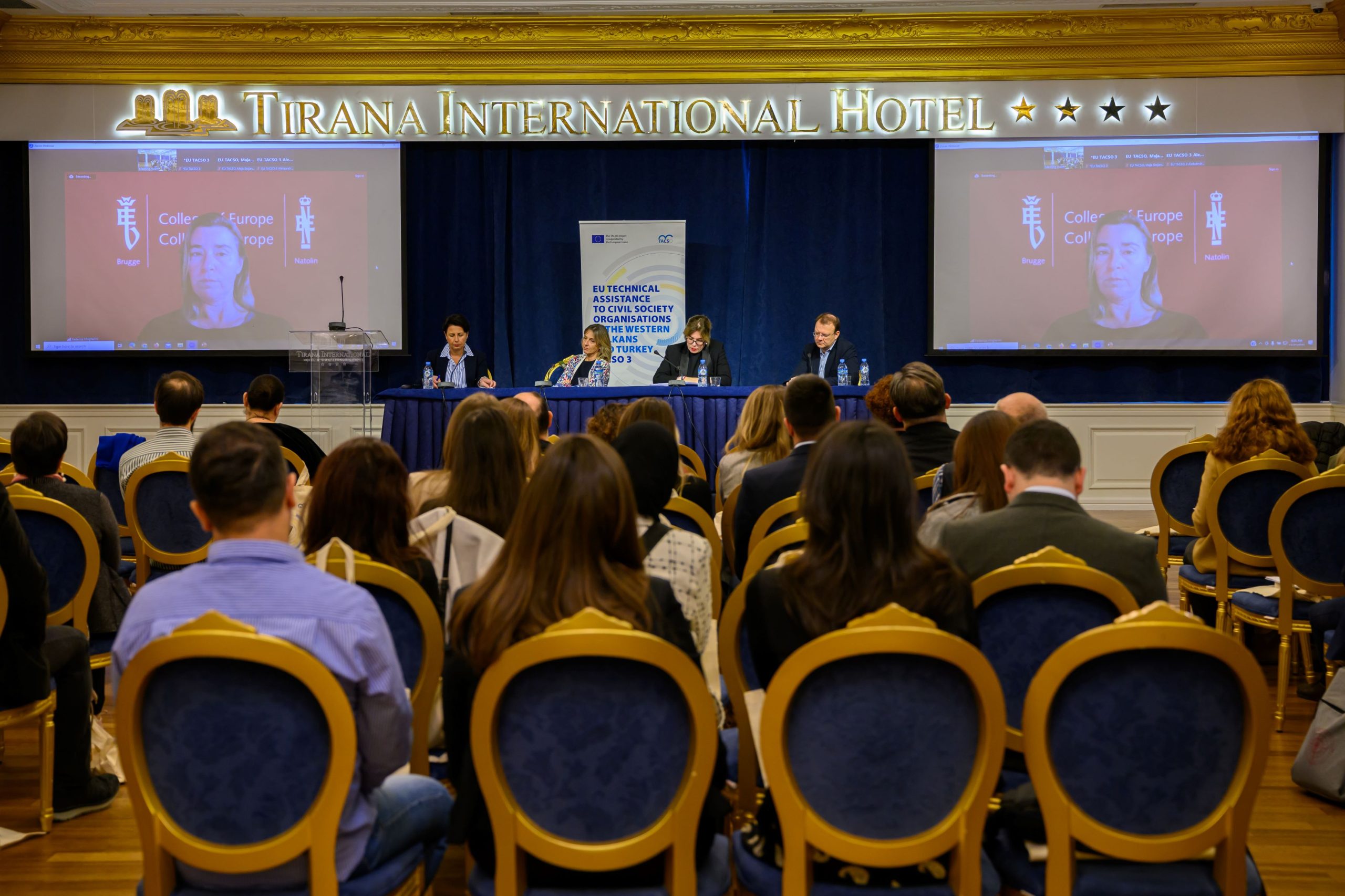
21st November, 2023 – Tirana, Albania — The “EU TACSO 3 and 2023 EU Year of Skills: Skills for Non-Profit Organisations in the Western Balkans and Türkiye” event commenced today in Tirana, Albania. This regional People to People event, held on 21-22 November 2023, plays a pivotal role in the European Year of Skills 2023, with a particular focus on advancing the non-profit sector’s capabilities in the Western Balkans and Türkiye.
The event aims to bring together key players from the non-profit sector, education, and government across the region and the EU.
Key objectives
- Enhancing cross-sector cooperation and collaboration.
- Recognizing non-profit skills in National Qualifications Frameworks.
- Maximizing Erasmus+ funding for non-profit education innovation.
- Building partnerships between academia and non-profits.
- Urging public authorities to increase support for the non-profit sector.
Ms Elira Demiraj, Director of the Economic Development Department, Ministry of Finance and Economy of Albania, opened the event with an address emphasizing the important role of skill development in the region. “The non-profit sector plays a significant role in the economy. When a sector employs over five percent, it’s considered a major contributor to the economy. For us, this sector is important. Our EU integration process aims to involve non-profits in various aspects of government work. They address critical societal issues, contributing in stability and equal opportunities in areas like advocacy, education, housing, and healthcare.
In Albania, our connection with non-profit organizations and civil society is multifaceted. For example, in our employment and skills strategy, we include measures related to NGOs. Moreover, the Albanian National Qualification Framework, established in 2010, is an essential tool for defining skills and improving employability connections. It ensures quality assurance in the labour market and provides guarantees for all stakeholders in skills and employment fields. We’re also recognizing non-formal skills gained outside the education system, increasingly relevant in today’s labour market. This recognition is part of the shift towards micro-credentials, a concept promoted in the EU’s skills scheme, where non-profits can play a significant role.”
Ms Lenka Vitkova, The Head of Rule of Law and Good Governance of the European Union Delegation to Albania, followed with remarks that underlined the EU’s dedication to enhancing skills in the non-profit sector.
“This event is significant as it aligns with two key EU agendas. Firstly, 2023 has been designated as the European Year of Skills, an agenda driven by the recognition that investing in skills is fundamental to the EU’s economy. With the imminent green and digital transitions, there is an evident need to enhance the skills of workers of all ages and groups. This aligns with the EU’s primary goal for this year: to promote lifelong learning. An ambitious target has been set for 60% of adults in the EU to engage in some form of lifelong learning annually.
Supporting civil society is another critical aspect, especially in the context of EU enlargement and accession negotiations with Western Balkan countries. Civil society’s role is crucial for monitoring and dialogues with the government, particularly in giving a voice to marginalised groups. It’s a key player in the accession negotiations and areas concerning the rule of law. Significantly, the non-profit sector accounts for 13% of the EU’s economy, underlining the importance of governmental investment and support. Skills within the non-profit sector are essential for effective communication, efficient operations, and active participation in decision-making processes.”
Ms Federica Mogherini, Rector of the College of Europe, in her inspiring keynote address titled “The EU, Education and the Western Balkans,” highlighted:
“Maintaining the independence of civil society is essential. We need to create space, norms, guarantees, and instruments, including financial ones, for civil society organisations and non-profits to act independently. On the other hand, civil society and non-profits play an active role in shaping and giving input to, as well as in monitoring, public policies as they are implemented by institutions. I’m very proud of the European Union’s focus in 2023 on skills, which are a key part of the educational priority, both at the European level and locally, and how this relates to accession negotiations and enlargement.
The matching of these two elements – skills and the enlargement agenda – is fundamental. The revitalised Enlargement Agenda offers a tangible and credible perspective for Western Balkan countries to join the European Union. It’s crucial for this accession, which involves investing in the skills, knowledge, and networks of citizens, individuals, and communities both in the Western Balkans and within the European Union. This investment will not only make accession credible and possible but also successful in the future. The new campus of the College of Europe in Tirana will fully play its role at the crossroads between skills development and enlargement agenda.”
Welcoming participants on behalf of civil society, Ms Juliana Hoxha, Director of Partners Albania for Change and Development, emphasised a powerful message: “Dear colleagues, civil society organisations in the Balkans are not just contributors but pivotal drivers of the skills agenda. Their advocacy, grassroots initiatives, and collaborative efforts are instrumental in our journey towards EU integration. Empowering them is not just beneficial; it’s essential for our collective future. Let us commit to this empowerment, fostering an environment where their potential can be fully realised for the betterment of our societies. “
The event’s second day features a ‘world café’ format, unique People to People experience encouraging dynamic interactions and idea-sharing among university representatives, civil society organisations, government officials, and funding agencies to foster partnerships and advance skills development in the non-profit sector.
For more information, including a detailed agenda, visit the event page.
